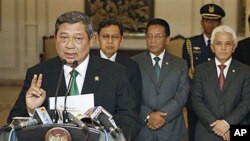The Indonesian president abruptly postponed a visit planned to the Netherlands, citing a human-rights case in the host country that could threaten him with arrest. President Susilo Bambang Yudhoyono was at the airport when he decided not to go forward with his three-day visit to the Netherlands to meet with the Dutch queen and prime minister.
Presidential spokesman Teuku Faizasyah said the president postponed the visit because of a legal case filed in a Dutch court concerning alleged human-rights violations in Indonesia. "The president, after due consideration and receiving a lot of feedback from the relevant ministers and also from our mission in The Hague, has decided to postpone the visit pending the development in the Netherlands where certain individuals brought a case against the president."
A group called the South Maluku Republic filed the human-rights case against the president. Its members are exiles from the South Maluku islands in eastern Indonesia. In the 1950s they tried unsuccessfully to establish an independent state and later were forced to flee to the Netherlands, Indonesia's former colonial ruler.
The case involves an incident in 2007 when President Yudhoyono was visiting the regional capital Ambon. At an event where the president was speaking, a demonstrator unfurled a flag representing Maluku independence, which is against the law in Indonesia. The protester was arrested and human-rights groups said was he beaten severely.
The South Maluku Republic said the president is ultimately responsible for human-rights abuses.
Faizasyah said the president holds diplomatic immunity and would not be charged, but he postponed the trip because the negative publicity would distract from his diplomatic mission.
The vice president of the South Maluku Republic group, Willem Sopacua, said it intends to keep the pressure on Mr. Yudhoyono to address the human-rights situation in the region. "Of course it is a great victory for us, psychologically. He understands every time he tries to come to the Netherlands we are prepared."
The Indonesian government denies the abuse allegations. The country has been credited with sweeping reforms that have freed the media and vastly improved human rights since the ouster of strongman leader Suharto in 1998.
